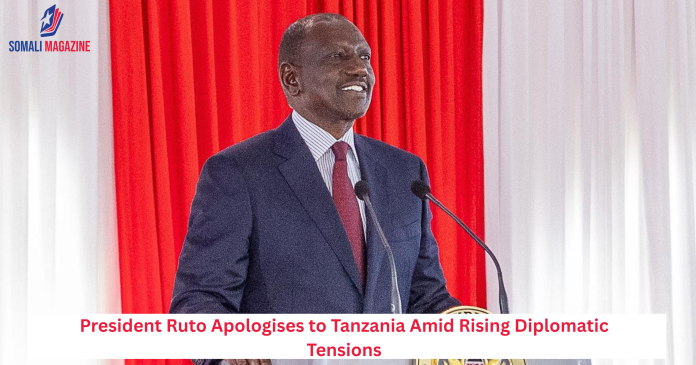Facebook Twitter (X) Instagram Somali Magazine - People's Magazine
Kenya’s leader seeks to ease cross-border conflict after activist deportations spark online clashes and official protests
Kenya’s President William Ruto has publicly apologised to Tanzania following recent tensions between the two neighbouring countries. The dispute started after Tanzanian authorities detained and deported East African activists, including Kenyan Boniface Mwangi and Ugandan Agather Atuhaire, who had travelled to Tanzania to attend the court trial of opposition politician Tundu Lissu.
Mwangi and Atuhaire claimed they were held without communication for several days and mistreated before being left at the border. This incident led to a strong reaction across the region, with many human rights groups and regional governments criticising Tanzania’s actions. Both Kenya and Uganda filed official protests, accusing Tanzanian officials of denying access to their citizens and ignoring repeated requests for consular support.
The situation sparked a storm on social media. Many Kenyans, especially young people known as Gen-Zs, took to platforms like X (formerly Twitter) to express anger. They criticised Tanzanian President Samia Suluhu Hassan and accused her of silencing activists. In response, Tanzanian lawmakers accused Kenyans of cyberbullying and interfering in Tanzania’s internal matters.
During a national prayer breakfast on Wednesday, President Ruto took the opportunity to call for peace and understanding between the countries. He addressed both Tanzanians and young Kenyans in his speech.
“To our neighbours in Tanzania, if we have wronged you in any way, we ask for your forgiveness,” Ruto said. “If Kenyans have done anything disrespectful, we sincerely apologise.”
Ruto also extended his apology to Kenyan youth, who have been critical of his leadership, especially after the deadly anti-tax protests in June 2024. While some appreciated the gesture, others dismissed it and insisted that the president should resign instead.
Ruto’s remarks came after visiting American preacher Rickey Allen Bolden encouraged leaders to promote forgiveness and unity. The preacher had urged Kenyan leaders to work towards reconciliation, especially with young people and neighbouring nations.
Meanwhile, the online war between Kenyan and Tanzanian social media users continued. Heated exchanges involved memes, insults, and even personal attacks. Some Kenyans went as far as sharing the contact information of Tanzanian lawmakers and sending them angry messages via WhatsApp.
One of the MPs, Jesca Msambatavangu from Iringa Town, said she had to switch off her phone because of the flood of messages. Despite the situation, she saw a chance for open dialogue. Msambatavangu invited young Kenyans to discuss their views through a WhatsApp group and even offered to host a live session on Saturday.
“Kenyans are our neighbours and brothers,” she said. “We cannot ignore each other. Let’s exchange ideas respectfully.”
The diplomatic tension started after President Samia made strong statements warning foreign activists not to interfere in Tanzania’s internal politics. She said she would not allow outsiders to create “chaos” in the country.
So far, the Tanzanian government has not responded to the torture claims made by the activists. However, the incident has highlighted the fragile relations between East African nations and how easily social media can inflame political issues.
President Ruto’s apology appears to be a move toward calming the situation, but it remains to be seen whether it will ease the online anger and restore trust between the two countries.
As of now, both citizens and leaders on both sides are being urged to engage in peaceful and respectful dialogue, rather than online hostility.

